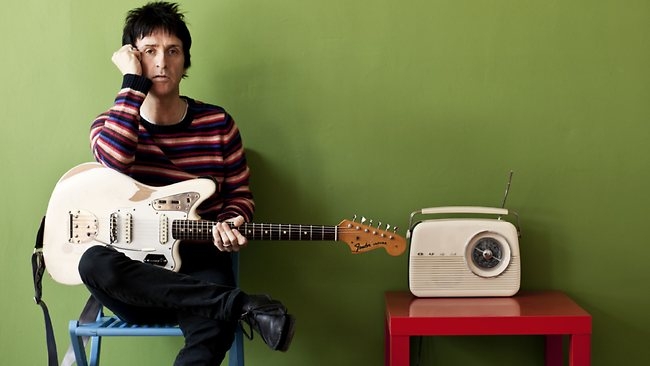“I’ll see someone on the tram and write two lines about them,” he says. “I’m always trying to collect information and put it through a spectrum and then try to write about it. It’s almost my job to try to live an exciting and romantic life so I have things to write about.”
Thankfully, the fruits of Wagner’s mania serve a communally beneficial purpose. Released last October, The Smith Street Band’s latest album Throw Me In The River – the quartet’s third LP since adopting the name of the Collingwood neighbourhood hotspot five years ago – landed in the ARIA top 20. The band spent the remainder of 2014 playing live, marking a trail through the US, UK, Europe and Australia.
Last week The Smith Street Band kicked off yet another Australian tour, tagged ‘Get High, See Everyone.’ They’re doing their utmost to live up the tour’s title – along with Saturday’s sold-out date at The Hi-Fi, they’ve scheduled an U18s show at Northcote Social Club on Sunday and visits to Bendigo, Geelong and Ballarat. It’s been a jam-packed few months, but that hasn’t dulled Wagner’s songwriting urge.
“I’ve got 30-something demos for the next Smith Street record, whenever that’s going to happen,” he says. “My relaxing downtime activity is writing and playing guitar. I play guitar for hours everyday. It’s like a puzzle that you’ll never quite finish but it’s really satisfying when you find the right piece.
“I don’t really write for the band,” he adds. “I write to stay sane. Since I was really young – 13 or 14 – it’s been a coping mechanism for me, to sit down and write lyrics. It helps me understand how I think about things and helps put things in perspective a lot for me. I’m constantly writing.”
Wagner’s tendency to use songs as a means of finding clarity amid experiential congestion is evidenced by the darkness that frequently crops up on Throw Me In The River. It’s not darkness of the horror film variety; rather, it’s a lived in emotional murk, a place of self-disgust and shattered fancies. It’s not all doom and gloom, however, as Wagner’s lyrics regularly contain signs of hope within reaching distance.
The line “I just want someone to talk to/ Someone to hold their hand against my hand/ Say it’s alright, I understand,” (taken from It’s Alright, I Understand)is a prime example of how often the misery-mending force is another’s embrace. Yes, despite The Smith Street Band’s loud, aggressive nature, the subject underpinning a vast portion of their catalogue is love. As ever, life experiences provide Wagner with excellent creative fodder in this regard.
“The last few break ups I’ve had, the people have been like, ‘This is going to end up on a fucking album isn’t it?’ and I’m like, ‘Yeah… sorry’,” he says. “I really like people and interacting with people – especially being able to go overseas and meet people from completely different backgrounds to anything that I’ve ever experienced. People will just put ideas in my head. Everything’s sort of constantly inspiring me.
“My mum’s an author. I remember when I was 15 or 16, going through a really bad break-up, and she just said, ‘Well you’re a creative person, so when things like this happen to you it’s bad, but it’s material.’ That’s something that’s really stuck with me.”
By looking deeply into one’s thoughts, with hopes of recovering something of creative utility, a writer risks their work growing uninvitingly insular. Conversely, gifted lyricists are able to depict scenes and emotions with such vivid accessibility that listeners are made to feel like part of the action.
On past releases, Wagner’s frequently referenced specific Melbourne sites and phenomena, which added greater interest for local listeners. On Throw Me To The River, he turns his attentiontowards a number of overseas locations he’s visited during the last couple of years. In spite of this, lines such as “The first time we made love/ It was dark and we were drunk/ In someone else’s hostel bathroom,” from Calgary Girls,provide enough tactility to prevent alienating any listeners who are only familiar with the 3000s postal region.
“When I’m writing lyrics I try to take myself out of it as much as I can,” Wagner says. “Especially now that a few more people are listening, it’s easy to get caught up about saying the right thing, or, ‘Should I be singing only about myself?’ or ‘Should I make it about everyone?’ The songs I really like and relate to – same with books and authors – are things that are written in a very immediate way. I try to do that with songs as much as I can.
“As soon as I come up with an idea for anything, I start recording straight away so that all of those initial flurry of ideas are there,” he continues. “I try not to edit as much as I can… I try to just let it come out. I don’t really understand how it works; I don’t think anyone really does. I just try to let my hand write whatever it’s writing and see what happens from there. I do try to make everything very immediate and upfront. I want things to be impactful when we’re playing them.”
Speaking of international travel, gigging in the Northern Hemisphere is now a regular component of life for The Smith Street Band. The band’s fortunes overseas have been on an upward slant for a couple of years now, but they’re not occupying billboards in Times Square just yet. International touring is a gamble for most performers – and particularly so for an independently run enterprise like The Smith Street Band – but Wagner isn’t the type to moan about the rough side of life as a musician.
“We make less than minimum wage off the band, but I can’t think of any job I would rather be doing than going to Europe twice a year,” he says. “It’s pretty awesome. Even going on tour and losing money on tour, it’s like, ‘Well, what else are you going to spend money on besides going overseas and having an incredible time?’ That’s not losingmoney, that’s spendingmoney. I think so many bands get caught up on that, like, ‘Oh if we go to Europe we’ll lose money.’ Yeah, you’ll lose money the first five times you go to Europe. But you get to go to fucking Europe.
“In the middle of six months of touring, you just wake up feeling like dog shit and it’s like, ‘Oh God why do we have to keep doing this?’ It’s like, ‘Well, it’s still better than working at a call centre’,” he laughs.
Visiting countries that many folks only dream of seeing is definitely a perk of the job. What’s of greater importance for Wagner, however, is that the people coming to the shows – be they many or few – get something meaningful from the performance. When that’s the case, there’s no other payment that could even compare.
“You put out records and make them as cheap as you can and tour heaps and work your arse off – that’s what makes me feel good about playing music,” he says. “I’m not worried about numbers and record sales. It’s more like, if a few people come up to me after a show and say, ‘That was fucking incredible’, that means so much more to me.
“Because we do play so much, I’m so used to getting that positive reinforcement of playing shows. You know, every night people just applaud my decision to drop out of university. It’s pretty easy to get addicted to.”
BY AUGUSTUS WELBY







